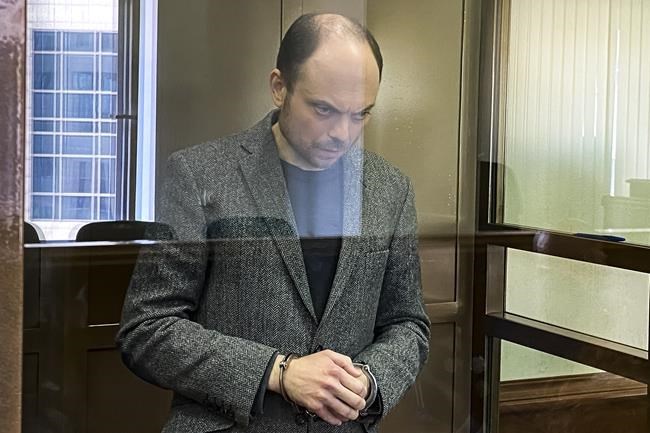OTTAWA — A cross-party group of MPs and senators is hoping to grant honorary Canadian citizenship to Russian political prisoner Vladimir Kara-Murza in the coming weeks.
"He embodies the movement for a democratic Russia," Ontario Sen. Ratna Omidvar said a Thursday press conference, joined by representatives from most parties and Senate groups.
Kara-Murza is a prominent Russian journalist and activist who has helped lead a political party in Russia.
In April 2022, Russian authorities detained Kara-Murza and charged him with "spreading deliberately false information" about the invasion of Ukraine, which Moscow prohibits calling a war.
Former attorney general Irwin Cotler alleged that Kara-Murza was poisoned twice upon returning to Russia after testifying in Canada about changes to Ottawa’s sanctions regime that brought in a tougher stance against the Russian government.
Honorary citizenship, Cotler argued, would send support to all Russians detained for speaking out against the full-scale invasion of Ukraine, with the Russian human-rights group OVD-Info saying more than 20,000 people are in that category.
"He is the personification of justice, the embodiment of the struggle for democracy," Cotler said.
"We will be honouring all those cases and causes for which he has stood so bravely, which reflect and represent Canadian values."
He said both chambers could pass motions asking Ottawa to grant citizenship, or the government could unilaterally make that decision.
Quebec Sen. Pierre Dalphond said he plans to table a motion as soon as all Senate groups have been consulted about the motion, in the hopes of it passing with unanimous consent.
Liberal MP John McKay said the upper ranks of the government support the motion.
"We've got all the parties on side, we've gone through the various ministers that would be affected, and they are on side. We are now at the point of the House leadership, that hopefully will sign off on a unanimous consent motion or something similar," he said.
The Toronto MP said Kara-Murza is one of Canada’s best hopes for Russia to become a democratic country.
"For his sake, and for our sake, and for the sake of the Russian people, I sincerely hope that he survives to see a directional change in government in Russia."
At a Thursday press conference, the move was endorsed by MPs from the Liberal, NDP, BlocQuébécois and Green parties, who said they also had support from a Conservative MP who planned to join them but was unable to do so.
The Raoul Wallenberg Centre for Human Rights, which Cotler founded, issued a letter Wednesday arguing that honorary citizenship would give Kara-Murza "life-saving protective cover as he languishes in prison."
The letter was signed by 30 prominent Canadians, including former prime minister Kim Campbell and former foreign minister Peter MacKay.
Russia's ambassador in Ottawa, Oleg Stepanov, was unfazed by the idea.
"I don't think this motion would have any practical outcome beyond 15 seconds of limelight for those who suggest it," Stepanov wrote in an email.
Parliamentarians last voted to grant someone honorary citizenship in 2014, and Pakistani women's activist Malala Yousafzai accepted the honour three years later in Ottawa.
Cotler said that Kara-Murza should be freed under Russian law since he has polyneuropathy, a nerve condition that is causing ill health.
"His being detained in prison is a form of torture, if not a slow-moving execution. And so that's why we have to move forward with all deliberate speed," Cotler said.
In a Tuesday message from Vodnik prison in Moscow, Kara-Murza thanked supporters for their continued attention.
"Your messages and letters I've been receiving from all over the world have filled my prison cell with warmth and light," he wrote.
"Everything will turn out fine. There will be peace in Ukraine and freedom in Russia — because, in the end, the truth always comes out stronger."
Parliamentarians aren't seeking the same honour for Russian opposition leader Alexei Navalny, which Cotler said is because Kara-Murza has stronger links to Canada.
This report by The Canadian Press was first published June 1, 2023.
Dylan Robertson, The Canadian Press




